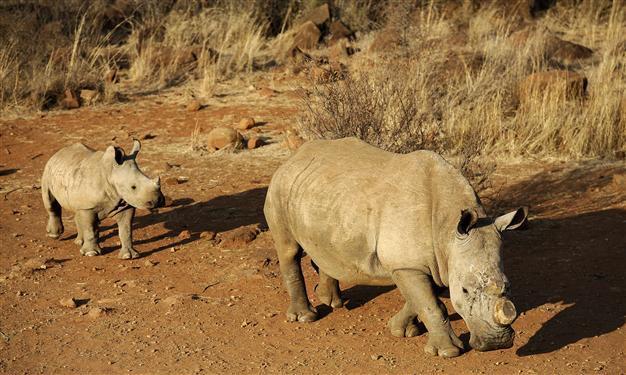'Horrific' record 1,020 rhino killed in South Africa
JOHANNESBURG - Agence France-Presse

A file picture taken on August 3, 2012 shows a black dehorned rhinoceros followed by a calf at the Bona Bona Game Reserve, in Klerksdorp, 200 kms southeast of Johannesburg. AFP Photo
A record 1,020 rhinos have been poached in South Africa this year, the government said Nov. 20, scuppering multiple efforts by authorities to curb the slaughter of the endangered species.
The vast Kruger National Park, has been hit the hardest by poachers, with 672 killed inside the park, which is roughly the size of Wales.
"To date, a total of 1,020 rhino have been killed for their horn since 1 January 2014," the department of environmental affairs said in a statement.
The poaching crisis has forced the authorities to move a number of rhinos to "safety zones", some in neighbouring countries.
Last year, 1,004 beasts were poached in parks across the country.
Demand for rhinoceros horn -- which is made of keratin, which is also found in hair and nails -- has skyrocketed in recent years, largely driven by the market in Asia, where the powdered horn is valued for its supposed medicinal properties.
South Africa has launched a number of initiatives to fight the scourge, including the deployment of the army along the border with Mozambique, a poaching hotspot.
Helicopters are also used to intercept poachers as well as armed ground patrols with sniffer dogs.
"Unfortunately the threat of poaching has continued to escalate while various multi-faceted interventions are being implemented by South Africa," the Minister of Environmental Affairs Edna Molewa said.
"We are concerned that poaching is part of a multi-billion dollar worldwide illicit wildlife trade. Addressing the scourge is not simple," she said.
South African National Parks (SANParks), which manages the country's parks, described the poaching statistics as "horrific" but maintained that they were not "fighting a losing battle".
"The figures are horrific," said SANParks spokesman Isaac Phaahla.
"We believe that they could have been worse if it wasn't for our current anti-poaching interventions," he told AFP.
Phaahla pointed at the 344 arrests of suspected poachers since the beginning of the year and occasional convictions as signs of "work in progress" in the fight against the scourge.
However, a large number of heavily armed poachers still manage to sidestep rangers on a daily basis, shooting the animals with high calibre hunting rifles, before hacking off the prized horn.
Phaahla said the current relocation of rhinos was one of the key population management efforts in a five-year plan by authorities to curb poaching.
In July, a court sentenced a rhino poacher to a record 77 years in prison, and dozens of people are currently being tried for poaching.
In September, police claimed to have arrested a suspected ringleader of a poaching gang believed to be behind at least 24 rhino killings between 2008 and 2012.
The arrests were followed in November by a haul of 18 rhino horn seized at Johannesburg airport on a flight from Mozambique to Vietnam.
South Africa is also looking into the thorny subject of legalising the trade in rhino, hoping it would help minimise the demand and save the species.
But the issue has been met with mixed reaction from officials and conservationists, who say it could serve only to increase demand.
South Africa is home to around 20,000 rhinos, some 80 percent of the world population.
